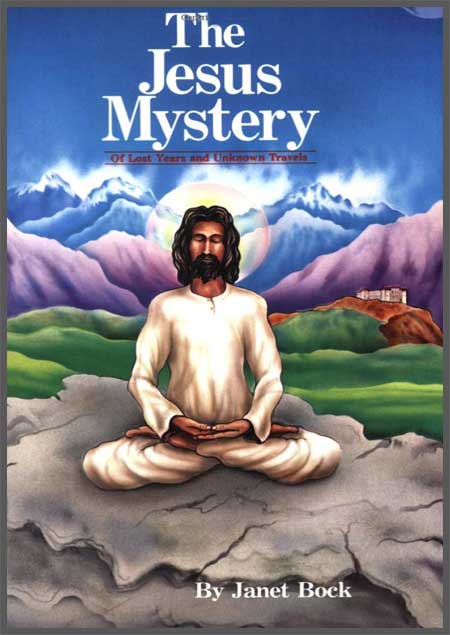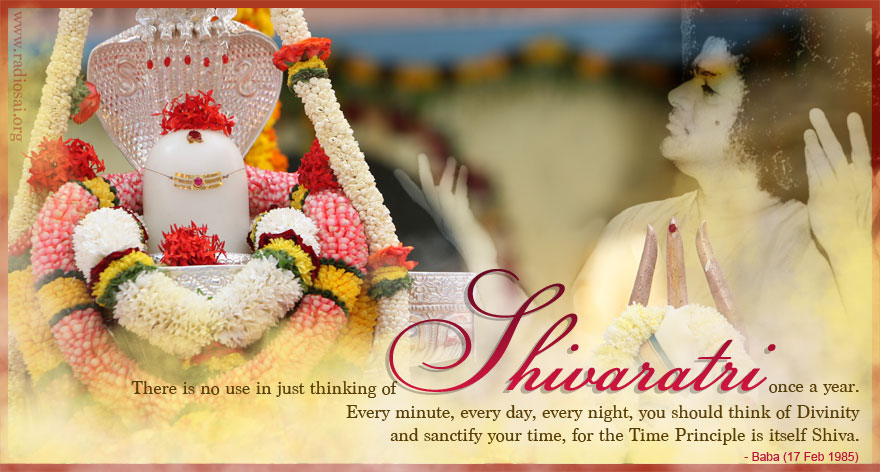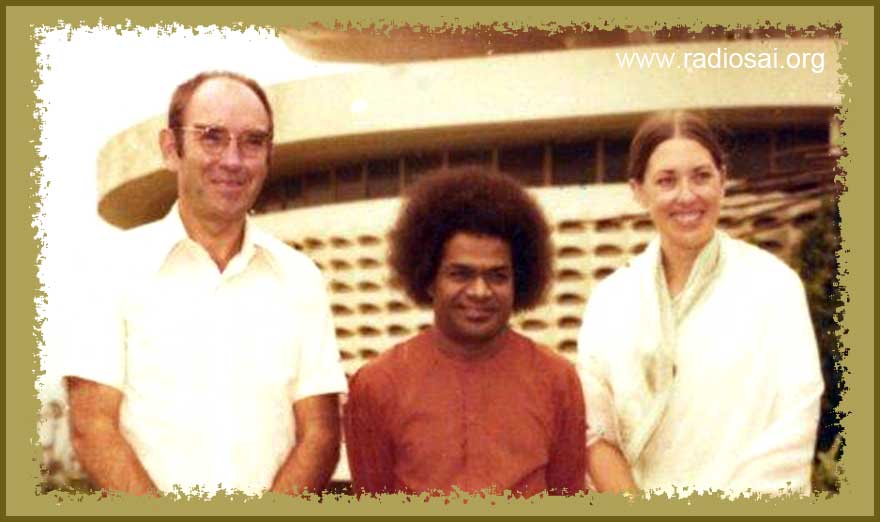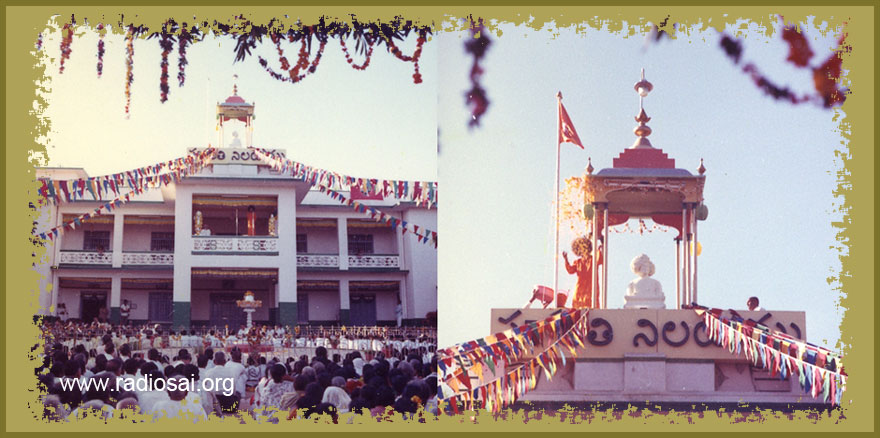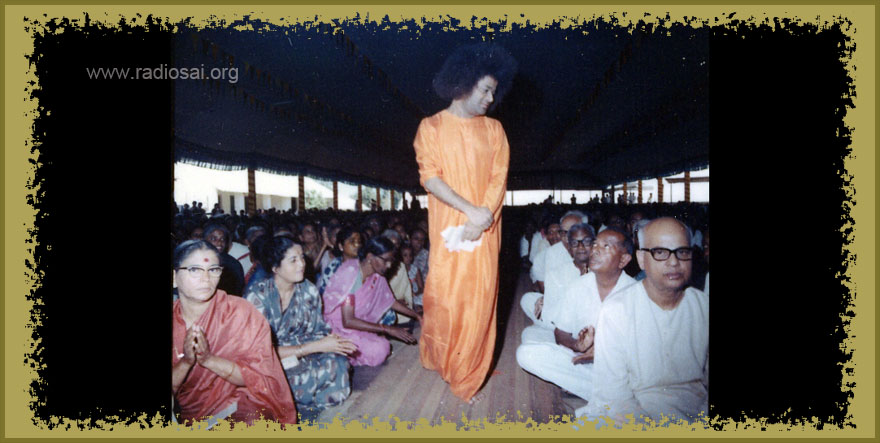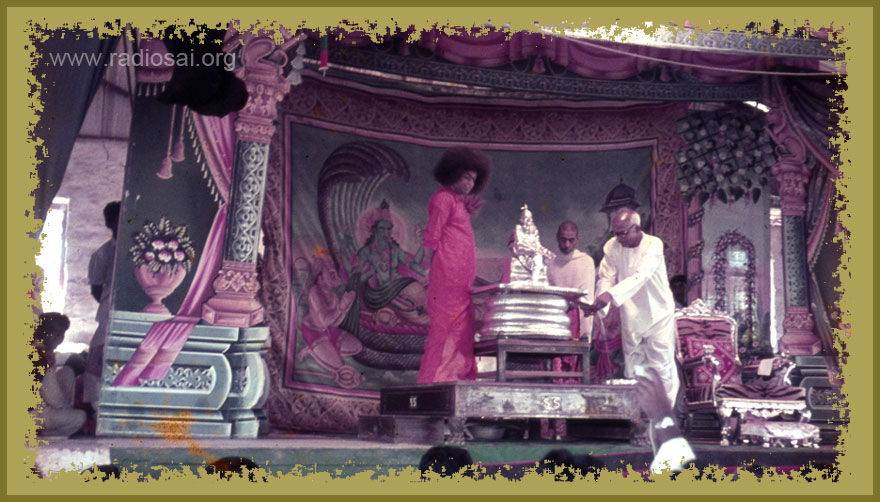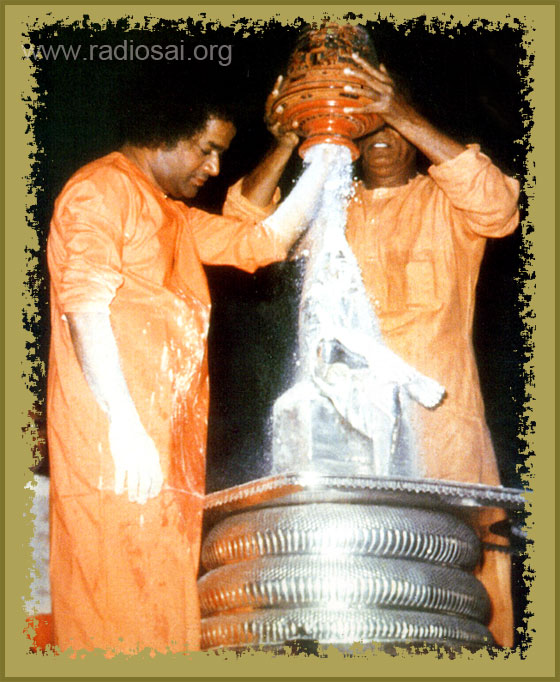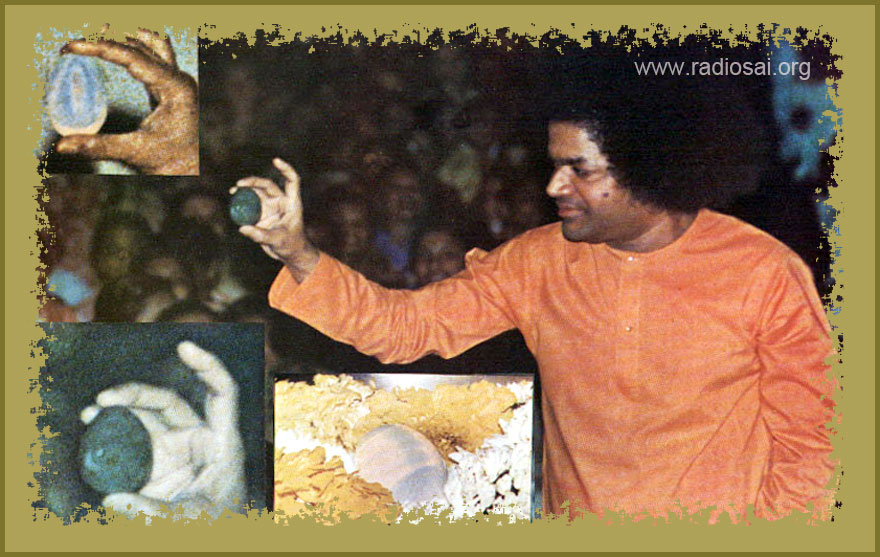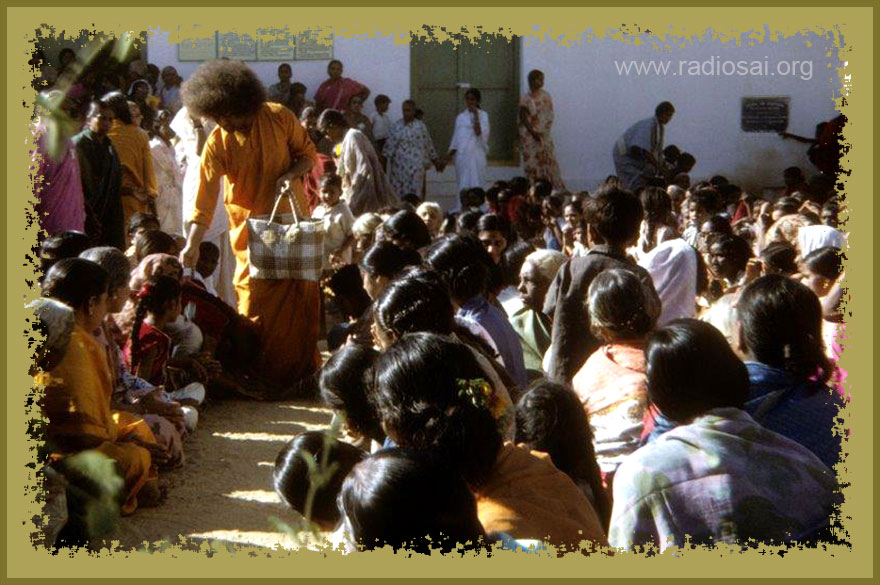|
|
|||||||||||||||||||||
|
Alluring Shivaratri Spectacle of Yesteryears
by Ms. Janet Bock Bicker
Excerpt from the book, 'The Jesus Mystery', pp. 176-180, by Janet Bock, Aura Books, Los Angeles, CA. 1980. Towards the end of my first week people began arriving for the festival called Maha Shivaratri, one of the major holy days of the year. It is held all over India on the day of the new moon between February and March. The dark of the moon is important because the moon is recognized as the presiding deity of the mind and, when it is full, the mind is rampant, hence the Western use of the word lunatic. When the reflected light from the moon is reduced to a slender arc the mind is calm and worldly tendencies can be more easily overcome through spiritual practices. Each year this day and night are set aside for meditation, fasting and singing the name of God.
At Prasanthi Nilayam, in Sai Baba’s presence, Shivaratri takes on added meaning. For many years a unique ceremony has taken place called the Lingodbhava, at which time Baba brings forth the one or more lingams materialized inside His body. These lingams have appeared as elliptically-shaped stones of varying clarity and colour, sometimes as much as three or four inches in length. They symbolize the manifestation of the un-manifest, that moment when the infinite becomes finite in the form recognized as the seed or egg out of which new life, in this case new spiritual life, is born.
During
an afternoon visit with Balbir she told me of the Shivaratri
festival two years earlier when Baba gave the lingam to her
stepdaughter, Her Highness, Maharani Prithivi Bir Kaur of Jind, whom
she was expecting to arrive at any time. Several things struck me
about Prithivi when we met, her name in Sanskrit meaning earth or
world, primarily her great vitality expressed through an impish wit,
a pair of dark flashing eyes and a beautiful smile. It seems strange
even now to think that someone like myself from a working class
family in Southern California could have much in common with someone
raised as royalty in an exotic Eastern land, but soon we were
talking and laughing, sharing past joys and sorrows like a pair of
reunited college roommates. The first function of the festival day was the ceremonial flag-raising from the top of the mandir, followed by the Vibhuti Abhishekam in the rectangular pavilion with open sides called the auditorium. I had responded to a call for volunteers to help with the festival crowds, and after two days of chopping vegetables in the canteen and sweeping the grounds with a short handled broom, I was now positioned in the auditorium on the ladies’ side of the centre aisle, about ten rows from the front with instructions to see the crowds did not push forward.
The
auditorium filled up for the morning ceremony and still more people
came. I saw Prithivi on the outside and signalled for her to join
me. She managed to pass through the crowd and I inched over to give
her the seat on the aisle. The bhajan leaders began to
sing. All eyes held to the spot where Baba was to enter. It was then
my emotional catch-basin began to overflow. The part of my mind
which was viewing the symbolism and pageantry, and trying to keep a
rational perspective, came face-to-face with something much more
powerful. I suddenly felt as well as saw the overwhelming outpouring
of silent spiritual energy generated between Baba and the immense
crowd. He appeared in the distance, walking slowly to the centre aisle, than back to the far end of the pavilion, all the while turning from side to side, hands raised in blessing. Tears began to flow and try as I might they would not be stopped. The best I could manage was to pull the end of my sari up over my head and wipe my eyes with the end of it.
Baba
approached, His glance sweeping the crowds. Next to me, Prithivi was
hoping for some special recognition and I thought I would at least
be there to see it. I gave my eyes one last swipe with the sari and
looked up as He stepped past us, His glance taking in the vast
numbers. Then, before I knew what happened, His head turned and, for
an instant His eyes riveted mine with a look of undiluted power. As
I felt the charge my emotion was transmuted into calm. Prithivi,
turning to me with a look of mock indignation, laughingly whispered,
“You gave me your seat and you got my look.” But there was no time to wonder or comment. Baba had reached the centre of the stage and was standing next to a silver statue of Sai Baba of Shirdi. One of the pundits was holding a basin of water and Baba had rolled up both of His sleeves to the elbow and begun ceremonially bathing the statue before wiping it dry.
Prithivi
had prepared me for the possibility Baba might manifest some
talisman to place on the statue as He had done before. She had come
prepared with a small pair of binoculars and was watching His every
move. At what seemed to be a lull she handed them to me for a quick
look. As I raised them to my eyes Baba’s hand began to move and as
the statue came into focus I clearly saw manifest in the space
between the thumb and forefinger of His empty right hand a small
gold setting of eight deep red stones, surrounding a ninth stone in
the centre. As soon as it appeared Baba pressed it against the
forehead of the statue, where it remained. I immediately returned
the binoculars.
Now Mr.
Kasturi appeared holding an urn about eighteen inches tall. This was
to be the Vibhuti Abhishekam, the ceremonial bathing of the statue
with ash to symbolize the ultimate state of all physical matter. The empty urn was upturned over the statue. Nothing happened. Then Baba inserted His right hand into it and Vibhuti began to flow and flow and flow. The ash first covered the statue, then the base it rested on, and finally was even streaming into the audience; the lucky ones in front hurriedly collecting it, while the rest of us inhaled its fragrance. When,
after several more minutes, the soft, sweet-smelling ash seemed to
be everywhere and Baba’s arms and robe were white with it, He raised
His right hand to the audience, smiled and disappeared through the
back curtain. When the audience realized He had gone, there was a
wave-like motion rising and pressing toward the stage, with all of
us carried in its wake. Throughout the ashram a sense of gathering prevailed, like the mainspring of some enormous timepiece, the universe itself perhaps. Buses had arrived in the night and whole villages had walked for miles. Shivaratri is also a day for silence and fasting, so instead of the midday meal we rested and waited for the birth of the lingam. The evening function was to take place outdoors before a raised octagonal platform called the Shanti Vedika, beautifully painted with scenes from the Bhagavad Gita. It began with speeches by devotees. Then Baba spoke about the unifying aspect of God at the core of each atom in the universe. He spoke also of the elimination of the ego. He said: The elimination of the identification with body and its needs, satisfiable through the senses, is the main point of life. For you get the joy when these needs are fulfilled; grief when they are not, anger when something comes in the way, pride when you win over that opposition.
To eliminate the ego,
strengthen the belief that all objects belong to God, and that you
are holding them on trust. This would prevent pride, it is also the
truth. Then, when you lose a thing you would not grieve. God gave,
God took away. Of course, you hear almost all. After the speech was concluded Baba began to sing. A few minutes later He coughed, then sat down. The bhajans leaders took up the chant. He sipped water from a cup, occasionally wiping His brow. The spasms Baba was feeling were now visible as His throat constricted again and again. Then, as He held a white handkerchief in His outstretched hands we all saw a stream of light emerge from His mouth. He caught it and held it up. It was the lingam. Opalescent, smooth, lit from within, alive with the essence as well as the symbolism of Divinity.
After the birth of the lingam devotees maintained an all-night vigil of bhajan singing. At dawn Baba appeared for darshan and later in the morning He returned to distribute the ash from the Vibhuti Abhishekam which had been wrapped in small folded squares of paper by volunteers. Hour after hour He walked through the curving rows of devotees seated in front of the prayer hall and everywhere the ground was flat. I watched on and off during those hours. The immense numbers of people no longer impressed me, what moved me was Baba, giving, hand to hand, to the thousands who sat in silence. The sleeves of His robe were rolled up to His elbows, perspiration was causing the fabric to cling to His chest and back, as He moved relentlessly through the crowd. I had heard Him say, “I am your servant.” Now I saw this was true. - Janet Bock Bicker
|
|||||||||||||||||||||
